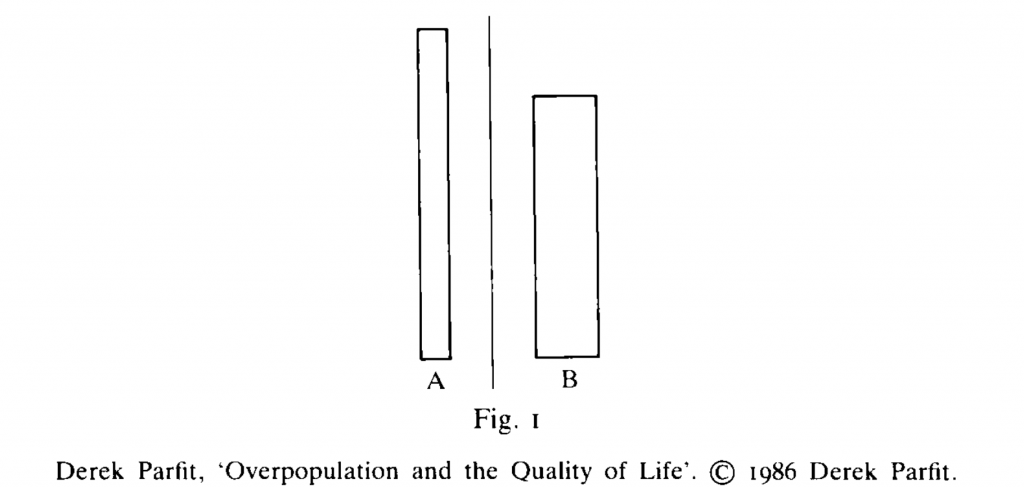
Suppose that you could make the world a better place, without too large a cost to yourself and without violating any deontological principles (for example, continuing to respect people as ends). Many people would suppose that, if you could, you would have an obligation to do so. Now, consider two possible worlds, A & B:

Derek Parfit (1986) writes of these as possible outcomes for a group in “Overpopulation and the Quality of Life”:
Consider the outcomes that might be produced, in some part of the world, by two rates of population growth. Suppose that, if there is faster growth, there would later be more people, who would all be worse off. These outcomes are shown in Fig. i . The width of the blocks shows the number of people living; the height shows how well off these people are. Compared with outcome A , outcome B would have twice as many people, who would all be worse off. To avoid irrelevant complications, I assume that in each outcome there would be no inequality: no one would be worse off than anyone else. I also assume that everyone’s life would be well worth living. There are various ways in which, because there would be twice as many people in outcome B , these people might be all worse off than the people in A . There might be worse housing, overcrowded schools, more pollution, less unspoilt countryside, fewer opportunities, and a smaller share per person of various other kinds of resources. I shall say, for short, that in B there is a lower quality of life.
Despite the fact that each individual’s quality of life is lower in B than in A, the total quality of life in B is, in some sense, greater, because more people exist in B, leading slightly less good lives-worth-living.
Is world B a better world than world A? If we had an opportunity to support policies that would make the world more like A, on the one hand, and more like B, on the other, would it be more appropriate to support policies that made the world more like B? And, how do our intuitions shift when we consider world Z, which Parfit describes as including “an enormous population all of whom have lives that are not much above the level where they would cease to be worth living…The people in Z never suffer; but all they have is muzak and potatoes” (148).

Leaving behind our vague obligation from above, to make the world a better place, suppose we accept some form of Utilitarianism, which claims that the right action is the one that produces the most good. Its hard to see how such a theorist avoids the conclusion that, all else being equal, World Z is preferable to World A. This is a version of what Parfit calls:
The Repugnant Conclusion: Compared with the existence of very many people— say, ten billion— all of whom have a very high quality of life, there must be some much larger number of people whose existence, if other things are equal, would be better, even though these people would have lives that are barely worth living.
We’ll discuss the ethical value of possible people and the Repugnant Conclusion at tomorrow’s Philosophy Strange Thing, at 4:30 in the Strange Lounge of Main Hall, If you’d like to learn more about these topics, here are some resources:
Parfit’s Article, “Overpopulation and the Quality of Life”.
The SEP Entry on the Repugnant Conclusion
An Economist Podcast on this material. (Skip to 11:20 for the piece on our topic.)
See you soon! Professor Phelan
